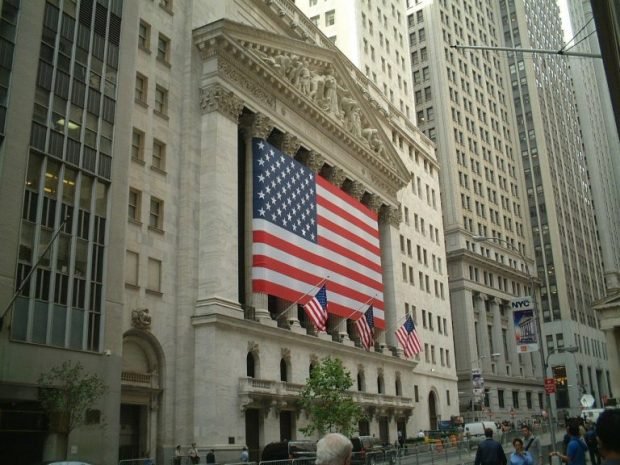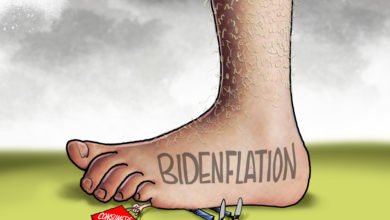$15 Minimum Wage Would ‘Spell a Death Knell for Many Small Restaurants,’ Expert Warns
President Joe Biden is pushing for inclusion of a $15 federal minimum wage in the next COVID-19 spending package, hoping it would stimulate the economy. But a top financial expert just warned it would do the opposite—and spell doom for restaurants and small businesses.
A higher minimum wage “reduces firm’s incentives to hire more minimum wage workers,” Olin Business School finance professor Radhakrishnan Gopalan said. “This effect would be all the more enhanced when firms are hurting from the pandemic.”
“The restaurant sector, which employs a significant number of minimum wage workers, and the retail sector are struggling,” Gopalan continued. “Raising the minimum wage now would spell a death knell for many small restaurants.”
The professor isn’t speculating. His research has shown that businesses respond to minimum wage increases by reducing future hiring, leading to an overall decline in employment among minimum wage workers.
And this is part of a broader empirical data set confirming what economic theory demonstrates: that minimum wage hikes eliminate jobs. As for the $15 minimum wage proposal, the nonpartisan Congressional Budget Office estimated that it would eliminate 1.3 to 3.7 million jobs nationwide. That estimate is using a pre-pandemic scenario—there’s plenty of reason to think the impact would be even worse now.
The Context: 2020 Was an Awful Year for Small Businesses
Minimum wage hikes cause unemployment even in the best of times. But small businesses and restaurants already had a particularly disastrous 2020. More than 100,000 small businesses permanently shuttered last year amid pandemic lockdowns and riots, while polling shows that 60 percent of small business owners worry they won’t make it through June 2021.
And that’s all before their labor costs skyrocket.
It’s a Simple Fact: Minimum Wage Hikes Would Crush Mom-and-Pops
Biden’s proposal for a federal $15 minimum wage and its companion legislation introduced by House Democrats might please labor unions and the Democratic base. But there’s really no question that it would screw over small businesses at the worst possible time.
“Big business may be fine with a dramatic increase of the federal minimum wage… as they’ve been thriving during the pandemic,” the National Federation of Independent Business explained in a statement. “But small businesses know these policies will make it even harder for them to compete against their larger competitors.”
Reality Check: Government Intervention Often Benefits Well-Connected, Established Interests
The Targets and Walmarts of the world might well be able to weather a huge spike in labor costs, but countless thousands of small businesses would not survive it. Overall, this would be bad not just for impacted entrepreneurs whose businesses go bust, but for the communities their businesses sustain and the workers they employ, not all of whom would find other work. Meanwhile, big chains and corporate giants would have less competition, eventually allowing them to jack up prices and consolidate market share.
Of course, large businesses have armies of lobbyists and spend millions schmoozing with lawmakers in Washington, DC. They no doubt would have a hand in crafting any minimum wage proposal, and it would be done knowing that it’s to their ultimate benefit.
The Washington Examiner’s Tim Carney, a long-time critic of crony capitalism, excellently articulated this reality in a recent piece criticizing Amazon’s recent lobbying for a higher minimum wage even though it already pays employees at least $15 an hour.
“The corner store that somehow has survived the pandemic and decades of competition from Amazon may pay a local college student $7.25 an hour to stock shelves,” he writes. “If you outlaw that job, you may help Amazon, but you also hurt that college student and that mom and pop. What’s more, you hurt the community.”
“Amazon knows that a higher federal minimum wage will not affect Amazon’s costs but will impose costs on its competitors,” Carney concludes. “A lower minimum wage doesn’t prevent Amazon from paying $15 an hour. It just allows its competitors to survive.”
Big Business can afford to pay more in labor costs, at least in the short term, if it means bankrupting their mom-and-pop competitors. The corner bookstore and your local restaurant don’t have lobbyists fighting for their interests in Congress. So, the supposedly progressive “Fight for $15” would undoubtedly redound to corporate interest, at the entrepreneur’s expense.
The people who push minimum wage hikes might call themselves progressives, but this cronyism is actually a feature, not a bug, of big government economic policy.
“In economically free societies everyone benefits when honest and hard-working men and women, who have confidence that they can retain the fruits of their labors, have incentives to invest and work harder,” Heritage Foundation economist James M. Roberts explains. “That confidence is destroyed when the economic system is controlled by a government that directs the largesse and power of the state to those with connections. This sort of corruption is the definition of cronyism.”
So, you should believe the experts when they warn that a $15 minimum wage would crush struggling small businesses right now. But don’t expect Big Business to complain.
This article was originally published on FEE.org



